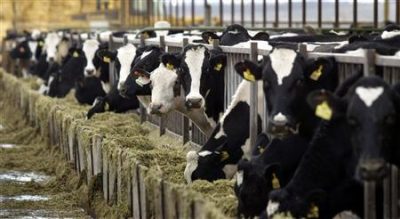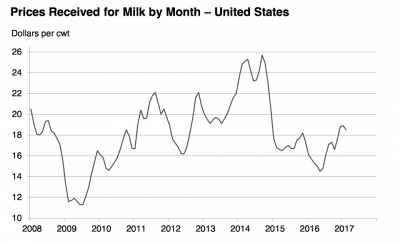Tariffs imposed by the Trump administration collected an estimated $958 million in revenue from selected agricultural inputs from February to October of 2025, according to North Dakota State University's monthly…
U.S., Canada Dairy Trade Issues
In a front page article last week at the Milwaukee Journal-Sentinel, Rick Barrett reported that, “Dairy farms in Wisconsin and other states could be forced out of business as early as May because of a trade dispute that has halted the export of their milk to Canada.”
FrtPg @journalsentinel Dozens of Wisconsin dairy farms could be forced out of business because of trade dispute, https://t.co/m2IMjumfnW pic.twitter.com/8dE2jwurHo
— Farm Policy (@FarmPolicy) April 6, 2017
“About 75 farms in Wisconsin have already been told that, in less than 30 days, Grassland Dairy Products of Greenwood will no longer buy their milk – leaving the farms without a place to ship their product in an already oversupplied market.
At issue is a U.S-Canada trade dispute over what’s called ‘ultra-filtered milk,’ a protein liquid concentrate used to make cheese. Grassland said it lost its Canadian business when Canada changed its dairy policies to favor domestic milk over a supply from the U.S.
The article explained that, “The losses for the dairy industries in Wisconsin and New York alone – in not having Canada as a market for ultra-filtered milk – could run into hundreds of millions of dollars, according to the National Milk Producers Federation, an Arlington, Va., trade group.”
Last week’s Journal Sentinel item added that, “‘Canada’s protectionist dairy policies are having precisely the effect Canada intended: cutting off U.S. dairy exports … to Canada despite long-standing contracts with American companies,’ Jim Mulhern, federation president and chief executive officer, said in a statement.
“The prices that Wisconsin dairy farmers receive for their milk have fallen below a profitable level in many cases. A national glut of the product has resulted in milk being dumped on fields and processors refusing to take more of it.”

Also last week, Bloomberg writers Lydia Mulvany and Jen Skerritt explained that, “Some U.S. dairy companies say that in the past week, they’ve lost all their Canadian sales of ultrafiltered milk, a concentrated ingredient used to boost protein content in cheese and yogurt. That’s due to a new policy rolled out in recent weeks that incentivizes Canadian processors to buy domestic supplies.
“The Canadian move violates trade commitments between the two nations, according to industry organizations including the U.S. Dairy Export Council and National Milk Producers Federation.”

Meanwhile, on the front page of Tuesday’s Journal Sentinel, Jason Stein reported that, “The federal government should act quickly to save dairy farms in Wisconsin and New York from a trade dispute, leaders from both states are urging.
The top farm leaders in Wisconsin and New York sent the letter Friday to a top official in the U.S. Department of Agriculture urging the federal government to step in and help farmers who may go out of business because of changes in Canadian dairy policies.
“The cascade reaction has put dozens of farms in Wisconsin at risk of losing a buyer for their perishable product since dairy processor Grassland Dairy Products of Greenwood will no longer be shipping to Canada. Wisconsin Agriculture Secretary Ben Brancel and New York Agriculture Commissioner Richard Ball are urging the U.S. government to help.”
FrtPg today's @journalsentinel Feds urged to rescue Wisconsin and New York dairies imperiled by Canada trade dispute https://t.co/YC778LLHTW pic.twitter.com/VlkOypvz1r
— Farm Policy (@FarmPolicy) April 11, 2017
Alternatively, in Wednesday’s Journal Sentinel, Rick Barrett reported that, “Canada says it’s being wrongly blamed for a decision by a major dairy processor that could put some Wisconsin farms out of business in less than three weeks.”
Mr. Barrett pointed out that, “The policies are ‘choking off sales of American milk to the detriment of U.S. dairy farmers,’ said Tom Vilsack, former U.S. Agriculture Secretary and now president of the U.S. Dairy Export Council.”
The article added that, “Not so fast on placing that blame, say Canadian farmers, who fault the U.S. for producing too much milk in a global marketplace flooded with it.
‘We don’t feel good about U.S. farms going out of business. But you know what? It’s not our responsibility. It’s your own responsibility, as a country, to manage your production,’ said Isabelle Bouchard, director of government relations for the trade group Dairy Farmers of Canada.
And in Thursday’s paper, Rick Barrett reported that, “Wisconsin’s congressional delegation has asked Commerce Secretary Wilbur Ross and Acting Trade Rep. Stephen Vaughn to address a dairy trade dispute that threatens dozens of farms in the state.”
The article stated that, “Wednesday, Gov. Scott Walker and the 10 members of Congress from Wisconsin appealed to Ross, Vaughn and Acting Agriculture Secretary Michael Young for help in the dairy dispute that U.S. farmers say could cost them hundreds of millions of dollars in lost sales to Canada.
“The Wisconsin delegation was joined by Democrats from New York: Senate Minority Leader Charles Schumer and Sen. Kirsten Gillibrand.”
Yesterday’s article added that, “Canada denies any wrongdoing and says the issue is about economics, not trade policy.”
And a joint news release yesterday from dairy and agricultural groups stated that, “In a joint letter sent today to President Trump, the International Dairy Foods Association (IDFA), the National Milk Producers Federation (NMPF), the U.S. Dairy Export Council (USDEC) and the National Association of State Departments of Agriculture (NASDA) urged the administration to tell Canadian Prime Minister Justin Trudeau to halt the new pricing policy and restore imports of the blocked U.S. products, specifically ultra-filtered milk. They also asked President Trump to direct U.S. agencies to ‘examine a full range of tools that could be used immediately to impress upon Canada in a concrete way the importance of dependable two-way trade.'”





